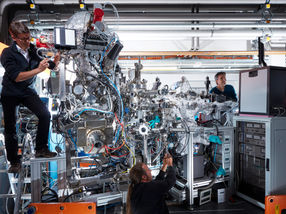Two supercomputers from Jülich among the ten fastest in the world
Supercomputers JUGENE und JUROPA/HPC-FF take places 3 and 10
Advertisement
In the decisive global ranking of the world’s fastest supercomputers Forschungszentrum Jülich has not one but two supercomputers among the top ten. JUGENE, Europe’s fastest computer takes place 3, and JUROPA / HPC-FF, the computer tandem developed in Jülich, is ranked 10th in the world and 2nd in Europe. This is the first time in the history of the global ranking that one single European institution has two computers among the first ten.
With its 72,000 processors, the supercomputer JUGENE achieves a top performance of more than 1 petaflop/s. JUGENE is used for very compute-intensive, complex simulations, for example in materials science, environmental research or particle physics.
With their more than 3,200 computing nodes, JUROPA and HPC-FF achieve a top performance of 308 teraflop/s.
Researchers from all disciplines will make use of JUROPA in order to discover how the climate is changing, how proteins are folded in cells, how new semiconductors function or how fuel cells can be improved. HPC-FF will be available exclusively for fusion research. For particularly large simulations both computers can be coupled. The two Jülich supercomputers JUGENE and JUROPA/HPC-FF are the only facilities outside the USA to be included in the latest TOP 10.
Most read news
Organizations
Other news from the department science

Get the chemical industry in your inbox
By submitting this form you agree that LUMITOS AG will send you the newsletter(s) selected above by email. Your data will not be passed on to third parties. Your data will be stored and processed in accordance with our data protection regulations. LUMITOS may contact you by email for the purpose of advertising or market and opinion surveys. You can revoke your consent at any time without giving reasons to LUMITOS AG, Ernst-Augustin-Str. 2, 12489 Berlin, Germany or by e-mail at revoke@lumitos.com with effect for the future. In addition, each email contains a link to unsubscribe from the corresponding newsletter.
































































